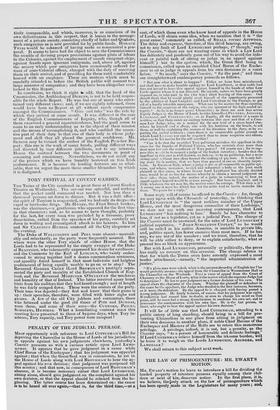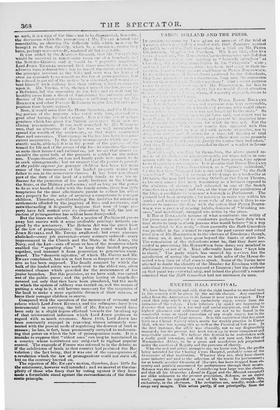THE LAW OF PRIMOGENITURE: MR. EWART'S MOTION.
MR. EWART'S motion for leave to introduce a bill for dividing the landed property of intestate persons equally among their chil- dren or next of kin, deserves notice. In the first place, it is, we believe, the/only attack on the law of primogeniture which has been openly made in the Legislature for many years ; and, es such, it is a sign of the tine's not to be disreeerdeL Secemh■ the discessien which the protaWeitei uf Mr, Fxv..tier n hirod %k:L•■ remarkable, as -showing the difficulty with which 111.iii van be brougtt to do that dir,aa ! y, which by a eircuiten, mere! t:ey have, perhaps uncot:sciously, rewleael all but ieuviezble.
It was stated by the Atort;ev-Cetteral, that ;‘Ir. would be auvotory in ninete-trote ra SC'S cur of a Iutolro.: : the Solivitor-Generat, said it would he `• ieefelie Lord JOHN 11.111'4ELL assumed ile:t these asst.! nen.: of les advieers were itelispeteble; but he feared the future eet-e-i,., the principle involved ia the ; and such was her.. ••• , t' even an approach to tei nested: tel the law of primeget,ieiee t:
he refused to get rid of the met' by a side-ivied, and w■
tent hit:1st:If wiih notleng le-s than putting t, oe_o, upon it. ?qr. TooKK, who, thungh a mon c f the law, eo a Reformer, ied the Imposition to the bail ; ate! av,evel t hostility crose from a dreod of flenieishine the itut:ier:;■ at:'! fluence of the aristocratie elos -e-, uiit lent I: t for ROEBUCK and ether Peet ieze give M l'AV.1.1C1., po: position their hearty support.
Now, it would seem that the Home Secretary, and the Ref ot- ing portion of the majority w he %late' with him, statiouil ;o gnat after having digosted a camel. It is ma the law ul r. ea.:• geniture which has given the ilritish aristocracy their hew de-
clining preeminence. It was well reinniktel by W tit ToN, that no alteratioa of the law was so well et:let:heed to spread the wealth of the a ristoeatcy, as that whic:: saactiered fines and recoveries. That change in the lae: has been to a g extent inoperative. In the faintly arrange:Ile:Its which are ev'l-
stantly made, a:Ilea:eh it is in tla power of the pat 11,0 tenant for litb and of the metier t1• the fee—to a:Torlioa
as suits their interest and hichttat•on, yet we see that alines! i variably the great bulk of the property is settled fill the ealest son. thiqUestionably, et-.tom and family pride have much to do in such arrangements: but we suspect that the power 10 prorid., at the public eapense for younger children has been tie mein cause of the transeession of the landed prererty claire from father to son in the aristocratic elasses. It has been teat :idemed part of the duty of the head of a noble family to u-e his in- fluence for the promotion of his needy brethren in the Church, the State, or the Military professions; and as long as the river to do so was handed down with the flintily estate, there was axle temptation for the most affectionate parent to reduce his eldest son's property for the sake of securing a competence to younger children. Therefore, notwithstanding the facilities for annulling settlements afforded by the jugglery of fines and recoveries, and notwithstanding it frequently happens that men of large me- perty have full control over its disposition by will, the law or custom of primogeniture has seldom been disregarded.
But the times are altered. Not a session of Parliament peas-es away but carries with it some profitable privilege hitherto en- joyed by the aristocracy. The Reform Act was the great blow at the law of primogeniture; this was the camel which Lord JOHN RUSSELL and -Mr. TOOKE swallowed: but every sinecure abolished—every job prevented—every estimate reduced—every improvement in the Church and the State, in the Army, the Navy, and the Law—cuts off more or less of the resources which enabled the " spending class" to keep their landed property together, and transmit it from generation to generation unim- paired. The "domestic injustice: of which Mr. Georg and Mr. EWART complained, has not in fact been so frequent or so exten- sive as has been supposed. The family compact by which the bulk of the landed estate was made over to the eldest sou, often contained clauses which provided for the maintenance of tne junior branches. But this provision, as we have said, was carved out of the public purse; and the public having at length dis- covered not only that they have been plundered, but the mode in which the system of robbery was carried on, and the means of putting a stop to it, it will become necessary for the magnates of the land to make a more equitable division of their es:tees, or leave their younger children to starve.
Compared with the operation of the measures of economy and reform which Lord Joust RusseLL and his colleagues have been instrumental in carrying, the bill of Mr. Eweee would have been only in a slight degree effectual towards the breaking up of that aristocratical influence which Lord Jona professes to regard with so much reverence. Since 1830, Lord JOHN has been constantly engaged in remaving abuses intimately con- nected with the present mode of regulating the descent of land in masses ; he has, in fact, been prominently' occupied in undermin- ing that power on which the law of primogeniture rests. It is a Mistake to suppose that "eldest sons can long be maintained in a country whose institutions are subjected to vigilant popular control. The example of France was referred to in the debate, as if the subdivision of lands in that country had produced the Re- volution ; the fact being, that it was one of the consequences of a revolution which the law of primogeniture could out stave off, but on the contrary hurried on. The rejection of Mr. Ewette's motion, therefore, does little for the aristocracy, however well intended: and we marvel at the sim- plicity of those who limey that by voting against it they have made a formidable stand against the encroachments cf the demo- cratic principle.



























 Previous page
Previous page